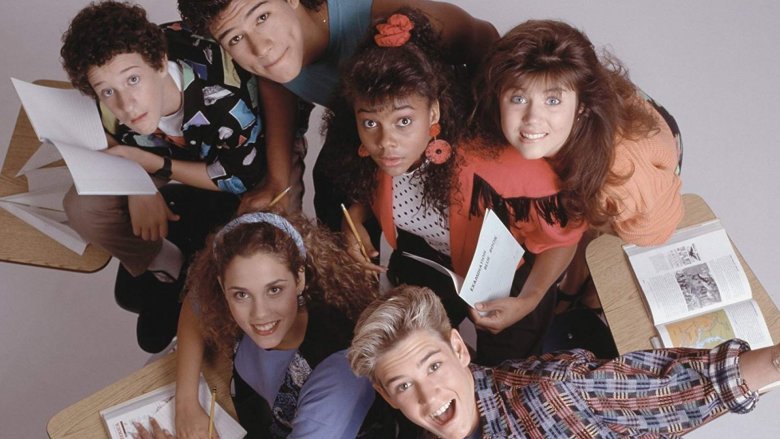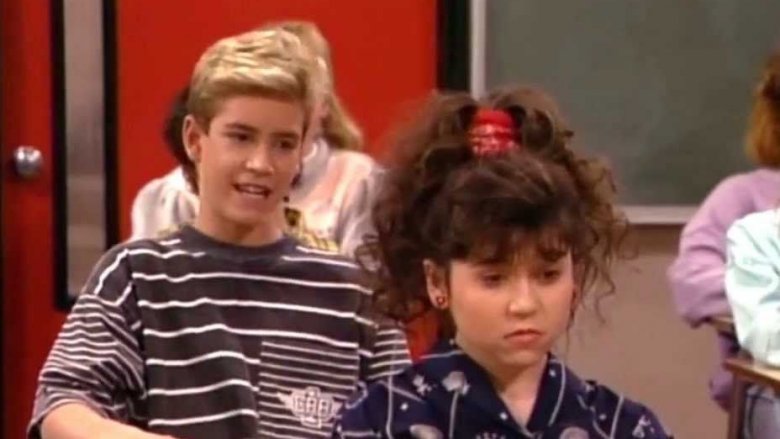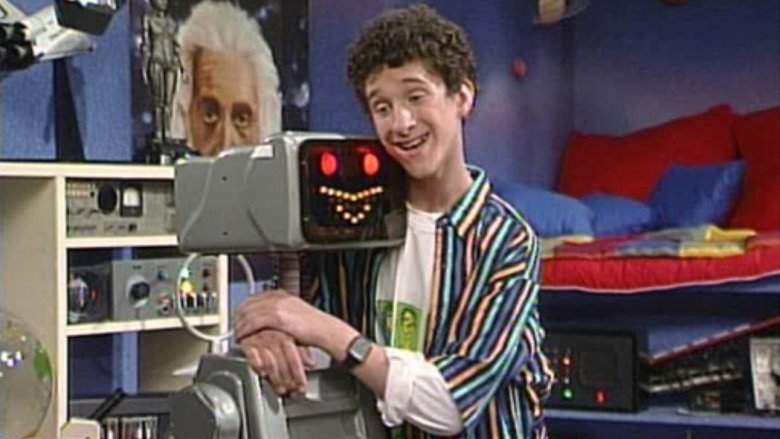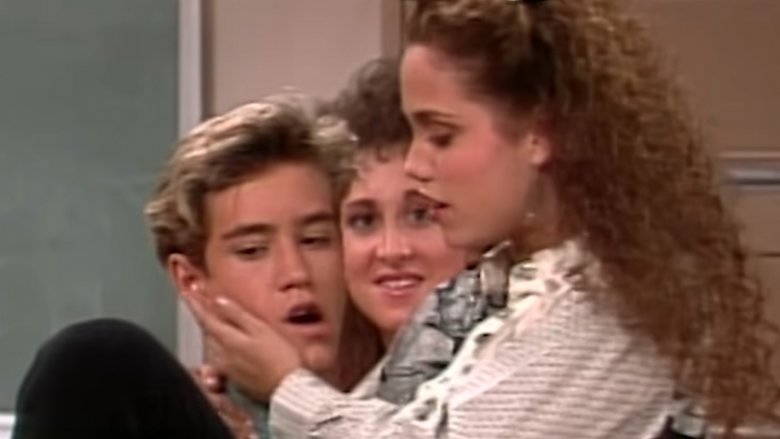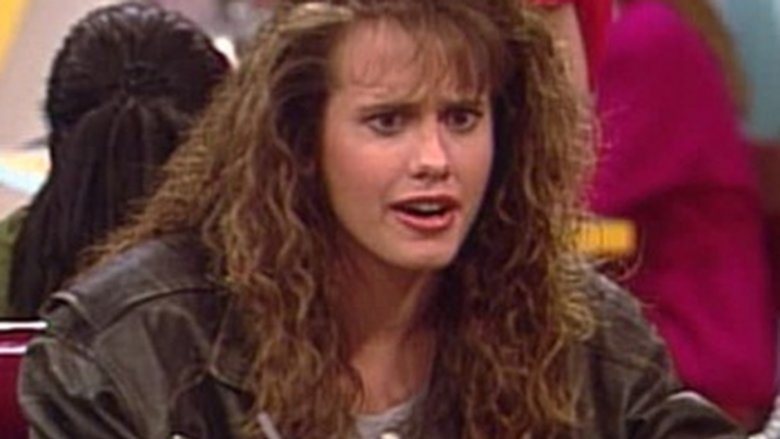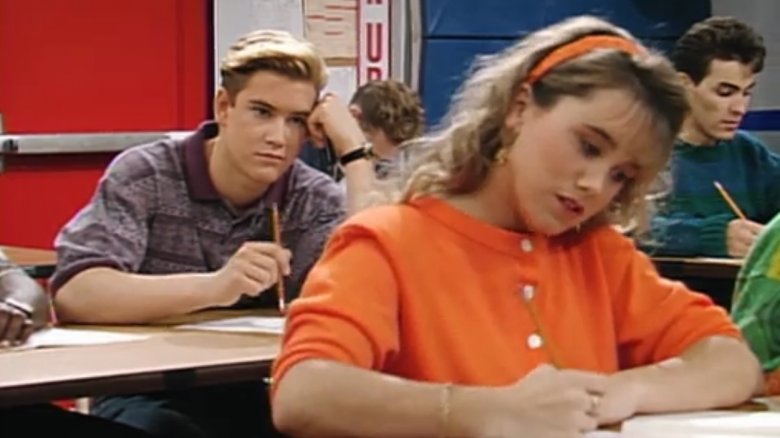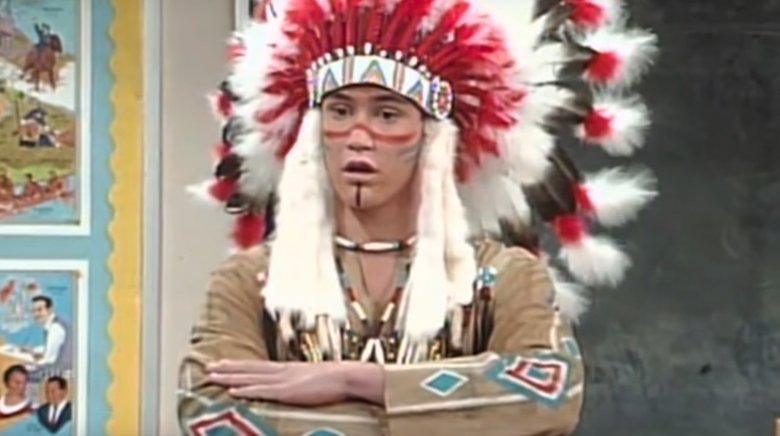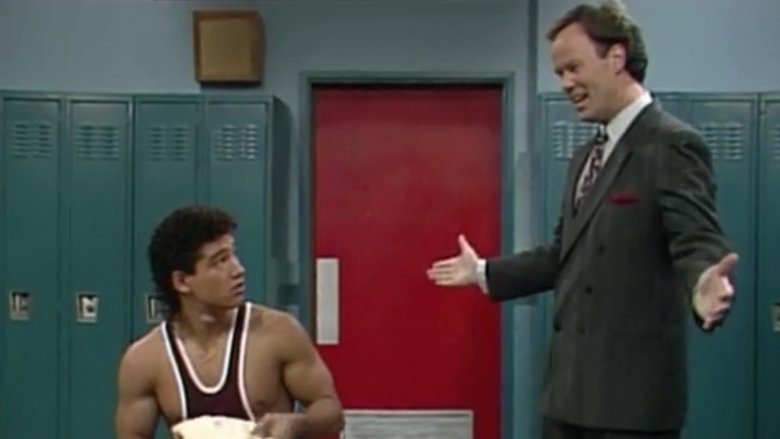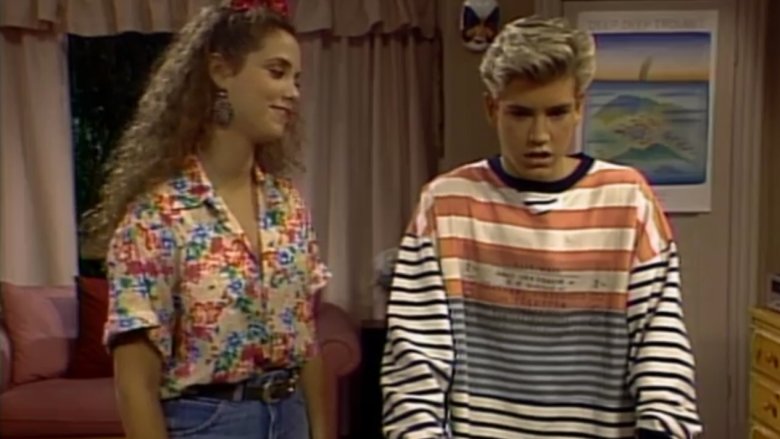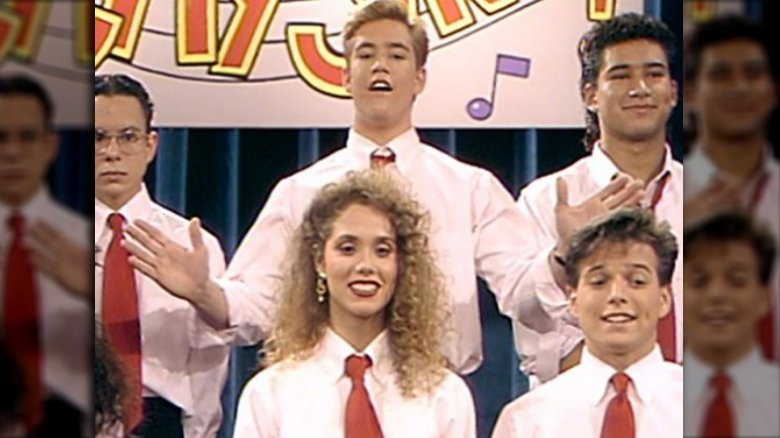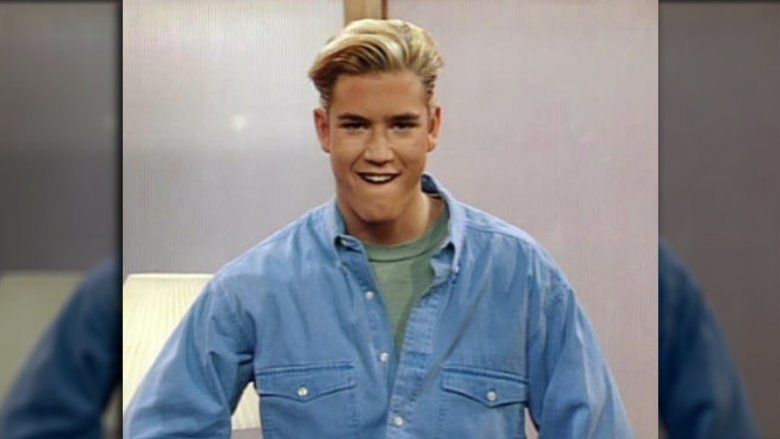Things Only Adults Notice About Saved By The Bell
For a generation of kids, there were few shows that could compete with Saved by the Bell. It had everything, humor, drama, love, and, of course, Kelly Kapowski and Zack Morris. For parents, Saved by the Bell was about as safe as TV came back then. While the show dealt with mature issues from time to time, it did so with an educational Saturday morning perspective.
Watching the show as adults, however, there are quite a few things that jump out at us. Granted, it's a slippery slope to look back at a show from the past, and write it off because it looks different under a contemporary lens. That's not what this is about. This is simply about highlighting the differences between then and now.
After all, Saved by the Bell has stayed the same. It's us who changed. We see the world differently now as adults than we did when we were young. For some of us, Saved by the Bell contributed to that change.
Here are things only adults notice in Saved by the Bell.
From Indiana to Los Angeles
We could write a full-length novel on the inconsistencies in Saved by the Bell, but perhaps the most jarring timeline mistakes in the show are all a result of the move between Good Morning, Miss Bliss and Saved by the Bell. When Miss Bliss was cancelled after one season, the show was revamped and made into the one we all know and love. Yet, while the school's location was changed from Indiana to Los Angeles, the characters who stuck around, namely Zack Morris, Samuel "Screech" Powers, and Lisa Turtle, all stayed the same. This led to some illogical backstories later in the series.
For example, Zack and Jessie often reminisce about their childhoods together as neighbors when they likely lived more than 2,000 miles away from each other. Kelly Kapowski apparently went to junior high with the group as well, but we know that can't be true either.
There is, however, one possible reference to the location switch. In "Aloha Slater," Mr. Belding, one of the characters who mysteriously moved from Indiana to Los Angeles, tells A.C. Slater's father that he was once stationed in Indiana as part of the National Guard.
Time Out
While Saved by the Bell had plenty of unrealistic antics and ridiculous plot points, the show was grounded in reality. Mostly everything that took place, however unlikely, could have actually happened, except for one major element. Whenever Zack said "time out," the world around him froze.
Now, as kids, we never really questioned why or how Zack was able to stop time and manipulate the events of his life before they happened, but we have to look at things a little differently in adulthood. In many ways, Zack Morris is a god. According to a persuasive argument in Cracked "After Hours," Zack may possess the greatest superpower of all.
"That's what's so perfect about this," the argument starts. "It's not disruptive to your everyday life. It doesn't draw attention, like super strength or flying. You don't need an alter-ego or a costume. Zack isn't plagued by villains chasing him or hateful press or anything. In fact, the only manifestation of his superpower is that everything goes his way."
It's likely because of this that some people buy into the theory that Saved by the Bell is all part of Zack's imagination or dream world. How else can you explain Zack's mystical powers, his incredible luck, or his elite status within the school? When you compare his change from junior high (Good Morning, Miss Bliss) to high school, the theory becomes even more plausible.
We need to talk about Kevin
Unlike many of the nerds in Saved by the Bell, Screech was no genius. He occupied a weird sort of in-between space of nerdom, more awkward than brainy, but he certainly had his moments. While his 1220 score on the SATs may not scream brilliance, Screech designed and built a sentient robot named Kevin. He was a wunderkind.
Now, the proliferation of robots and artificial intelligence on kids television might have helped us overlook Kevin's existence, but this was a creation that displayed artificial intelligence, a sense of humor, and understood social norms at least on par with his creator, Screech. The how is impossible to answer, but the why may be even more confusing.
That's the real question here, one that Sean O'Neal of The A.V. Club asked Dennis Haskins (Mr. Belding). "Why would you design a robot with that kind of artificial intelligence," he asked, "just to hang out in Screech's bedroom?" Haskins had no answer.
Earlier, O'Neal ranked Kevin as one of television's greatest wastes of artificial intelligence in "Why Was I Programmed to Love Screech," claiming that there was "perhaps no crueler fate for a robot than being programmed to hang out with Screech." In this "existential prison," O'Neal laments Kevin's sad existence, suggesting "his digital smile and flat wisecracks mask[ed] his deep inner torment as he doles out helpful suggestions and does Screech's dirty work."
Saved by the times
When we were kids, Zack was a true ladies man. He could do wrong. Whenever he gave a female his unsolicited attention, it was a blessing. The women should have thanked this golden-haired god for giving them the time of day. In many cases they did. Today, however, a character like Zack couldn't exist, at least, not without playing the villain.
Watching the show with a contemporary lens takes some of the sheen off Zack. As nothing more than an educational exercise in "times have changed," we look back to two episodes in particular where Zack's schemes went from innocent to practically criminal.
Take "Model Students," for example, an episode in which Zack creepily takes unwelcomed photos of female students in swimsuits and uses them to create and sell a "Girls of Bayside" calendar, a plot better suited for a modern horror movie than a kids TV show. Or, even worse, "The Zack Tapes," where Zack learns to use subliminal messaging to get his way.
Unfortunately for the women at Bayside High, Zack's "way" is to coerce women into relationships against their will — or as the Funny or Die "Zack Morris is Trash" series puts it: "[Zack tricks] two of his best friends into unwanted physical intimacy while sabotaging a blossoming relationship and [pushing] an entire high school to stop everything in an urgent attempt to curtail his sociopathic, evil villain zeal for mind control that should have had him imprisoned for life."
Disappearing classmates
It doesn't take an adult to notice that certain characters go missing throughout the seasons of Saved by the Bell. In fact, it doesn't matter what age you are, you would have to be in pretty rough shape not to notice that Kelly Kapowski mysteriously vanishes for about half the episodes in season four, let alone Jessie being absent as well. But it's only really as adults that we notice how scrambled season four really was and for good reason.
For half of that season, we saw episodes with the new student, Tori, played by Leanna Creel. This was because, after shooting the season four finale, the network ordered more episodes. Speaking with The A.V. Club, Dennis Haskins explained further: "They decided to do 10 more episodes to make it be 100 total for the package for syndication, and everybody's deal was up. Some of us said, 'Okay, we'll do 10 more.'" But not everyone was in the same position to do the additional episodes.
"It was pilot season," Haskins continued, "So Elizabeth [Berkley] and Tiffani [Thiessen] wanted to go on an do pilots." To help fill the massive void left by Kelly and Jessie, they brought in Creel, shot a 10-episode Tori arc, and then crammed those episodes into the middle of the season, bookending it with episodes starring the full cast.
Just say no
While Saved by the Bell taught kids plenty of valuable lessons, the show also had its fair share of fear-mongering, especially in regards to soft drugs. In the show's defense, the happy-go-lucky feel of Saved by the Bell just wouldn't allow for an episode on heroin, but it's hard for an adult to take seriously the drama surrounding caffeine pills.
Yet, according to the show's executive producer, Peter Engel, the caffeine pills were supposed to be speed. In his book, I Was Saved by the Bell: Stories of Life, Love, and Dreams That Do Come True (via Vulture), Engel explained that NBC's Standards and Practices vetoed the decision and made them change the speed to NoDoz pills.
"I wasn't pleased about it," Engel wrote. "After all, the average caffeine pill was the equivalent of a cup of coffee, if that, so we might as well have had Jessie get addicted to earl grey, or breaking into the Max to snort coffee grounds." But it wasn't just caffeine pills. The show went a little cuckoo over other drugs as well.
In "No Hope with Dope," marijuana was the culprit as actor Johnny Dakota is scolded for smoking the drug, and asking Kelly if she wanted some. Funny or Die hilariously ridiculed this plotline in its "Zack Morris is Trash" series, critiquing Zack as a narc, and Johnny Dakota as the well-meaning hero.
Famous guest appearances
It takes nearly 30 years of perspective to truly soak in how many stars appeared on Saved by the Bell over the years. Ignoring The College Years and The New Class, and even overlooking the star-studded pilot episode of Good Morning, Miss Bliss, Saved by the Bell played host to several then-unknown actors who would go on to become stars.
Long before Leah Remini became a household name on King of Queens, for example, she had a central recurring role as Stacey Carosi in the Malibu Sands story arc. Eric Dane, best known as Dr. Mark "McSteamy" Sloan on Grey's Anatomy actually made his acting debut in that Malibu Sands arc, playing one of the opposing volleyball players in "The Game."
Around the same time as she was cast in Beverly Hills, 90210, the show that made her into a star, Tori Spelling was playing the small recurring role of Violet Bickerstaff, Screech's girlfriend. Scott Wolf from Party of Five fame appeared in eight episodes, playing an unnamed student. He was usually spotted working as a waiter at the Max.
Then there was the stars who played even smaller roles, like Christine Taylor (above), Casper Van Dien, Denise Richards, and Michael Jai White. These actors all showed up in or around Bayside, some only in the background, very early on in their careers.
Subtle racism
While Saved by the Bell deserves some credit for its seemingly colorblind casting of its main actors, when the show did look at race and ancestry, there were some insanely cringeworthy moments. Incredibly, almost all of the most insensitive moments from the show come from "Running Zack."
In the episode, an ancestry report runs havoc through the group. As pointed out by Funny or Die, "Even though Jessie went before Zack and admitted that her family used to traffic slaves right after Lisa said her family used to be slaves, Zack has the most offensive and shocking presentation of the day by a mile." After that racist presentation, however, Zack goes out and does some actual research, meets with a real Native American, and then somehow becomes even more racist.
The entire episode has a very 90s post-race feel to it. Lisa jokes about slavery, stating, "My family calls this underground railroad the original soul train;" Jessie tries to bribe away her white guilt with soda pops until Lisa hugs her to make her feel better; and Zack misappropriates an entire culture for a class project.
Noting the era, the audience, and the time available to them, we acknowledge how difficult it would be to really nail this topic. Yet, as Emily Hashimoto of B***hMedia rightly asks, "if you can't do it right, with the richness the conversation deserves, why do it at all?"
Mr Belding is a little too familiar
In general, kids shows exist within an innocent universe. Add in that Saved by the Bell aired in the late 80 and early 90s, and you have a perfect storm of purity and sin-free entertainment. But adults are jaded. We've been beaten down by the world and groomed into downtrodden cynics. If there's something sinister lurking in the shadows of Bayside, we'll spot it.
It's for that reason that we struggle to see Mr. Belding the way we used to. He used to be part of the gang, a well-meaning principal who took an interest in his students. Nowadays, we wonder why he's laying on Zack's bed. In those days and in that world, however, there were no consequences for Belding's actions. Today, he wouldn't last long as principal.
In a Buzzfeed piece about the topic, the outlet lists 17 creepy moments from the Big Bopper, including spreading gossip, wrestling with Slater, and dropping near-constant sexual references. They didn't even mention how many times he got involved in plans to teach Zack a lesson, which often required him to shut down all learning activities to do so.
Off-brand feminism
It's tempting to give Saved by the Bell points for talking feminism at all, but Jessie Spano might have actually hurt the movement more than she helped. While some credit Jessie for introducing the concept of feminism to fans, others look at the negative connotations attached to Jessie's brand of feminism, and wonder if it gave a terrible first impression.
Jezebel suggests that the show created "The Jessie Spano Effect," which is defined as "the unwillingness to call oneself a feminist for fear of being labeled an uptight, neurotic b***h." Next to Jessie, the characters who opposed her were viewed positively.
B*tchMedia goes even further, calling Jessie's brand of feminism "destructive," and stating, "It has all the trappings of what a bunch of old men would assume feminism is all about. Jessie's feminism is a hindrance that makes her annoying, she's there to be made fun of. That notion is reinforced by the fact that even her female friends don't back her up most of the time. Contrasting Jessie with the popular Lisa and Kelly, the show's writers strongly suggest that being a feminist is unappealing."
Even Berkley wasn't thrilled about her portrayal. During an interview on Bethenny, Berkley spoke about her drab wardrobe compared the other girls. "I didn't like it because I felt like as a young woman, just because you are a feminist, why can't you also dress in things that make you feel girly and empowered," she said.
Magical musicians
Saved by the Bell featured many different musical moments throughout its run, but whenever the group actually got down to singing, they were pretty darn good. In fact, they were incredible. Was there anything these stars couldn't do? Well, for one, they couldn't really sing, at least, not well enough that the showrunners used their actual voices.
Now, it's very possible that you noticed the dubbed voices as kids, but perhaps you never realized just how blatantly obvious it really was. Aside from the Hot Sundae singing "Go For It," which does sound like the actors performed some, if not all, of the vocals, all of the big singing moments were dubbed over with actual singers.
To be quite honest, the dubbing is hilariously noticeable as well. While the stars were excellent lip-syncers and really sold their performances, the singing voices sound nothing like them. So that means Jessie and Slater serenading the school in "The Last Dance" was a sham. The entire "Rockumentary" episode and the Zack Attack band? Nothing more than an airband in fancy outfits. But don't be sad. We'll always have "I'm So Excited."
Is Zack Morris the baddie?
The rules of acceptable behavior have changed alongside our growing social awareness and sensitivities. Zack, and the kids watching him back in the Saved by the Bell era may not have known better, but we do. That's why, when watching this beautiful show as an adult, we might be hit with the nagging question, would Zack be the bad guy today?
This is the premise behind the Funny or Die series, "Zack Morris is Trash," a contemporary look at some of Zack's wilder schemes. But even back then, we knew Zack was flawed. It was how he learned from his mistakes that made him a good person. Still, it's hard to watch the way Zack treated others around him, and then forgive him simply because he learned it was wrong.
When Wendy wins Zack in "Date Auction," Zack ignores her, insults her, and shames her for being overweight. In "Home for Christmas," he insults homeless people and becomes slightly obsessed with feeding one of them. He constantly bullies the kids in school, and even mocks his friends. In "Teen Line," the victim of his insults, abhorred social obliviousness, and political incorrectness was a young woman in a wheelchair. It seems that nothing was sacred and no one was out of bounds for Zack, but, maybe, we learned to be better people through Zack's horrible mistakes.

